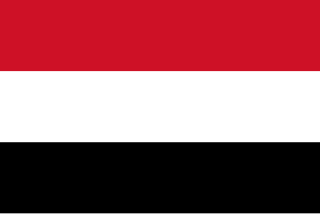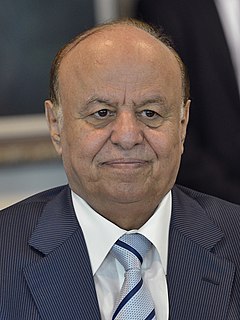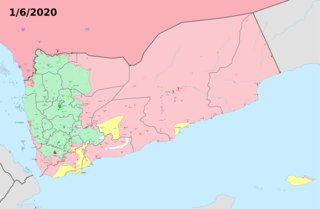
Aden is a city, and since 2015, the temporary capital of Yemen, near the eastern approach to the Red Sea, some 170 km (110 mi) east of the strait Bab-el-Mandeb. Its population is approximately 800,000 people. Aden's natural harbour lies in the crater of a dormant volcano, which now forms a peninsula joined to the mainland by a low isthmus. This harbour, Front Bay, was first used by the ancient Kingdom of Awsan between the 5th and 7th centuries BC. The modern harbour is on the other side of the peninsula. Aden gives its name to the Gulf of Aden.

The Arabian Peninsula is a peninsula of Western Asia, situated northeast of Africa on the Arabian Plate. At 3,237,500 km2 (1,250,000 sq mi), the Arabian Peninsula is the largest peninsula in the world.

Ali Abdullah Saleh was a Yemeni politician who served as the first President of Yemen, from Yemeni unification on 22 May 1990 to his resignation on 25 February 2012, following the Yemeni Revolution. Previously, he had served as President of the Yemen Arab Republic, or North Yemen, from July 1978 to 22 May 1990, after the assassination of President Ahmad al-Ghashmi.

Yemenite Jews or Yemeni Jews or Teimanim are those Jews who live, or once lived, in Yemen. Between June 1949 and September 1950, the overwhelming majority of Yemen's Jewish population was transported to Israel in Operation Magic Carpet. After several waves of persecution throughout Yemen, the vast majority of Yemenite Jews now live in Israel, while smaller communities live in the United States and elsewhere. Only a handful remain in Yemen. The few remaining Jews experience intense, and at times violent, anti-Semitism on a daily basis.

Yemen, officially the Republic of Yemen, is a country located on the southern end of the Arabian Peninsula in Western Asia. It is the second-largest Arab sovereign state in the peninsula, occupying 527,970 square kilometres. The coastline stretches for about 2,000 kilometres. Yemen's constitutionally stated capital is the city of Sanaa, but the city has been under Houthi rebel control since February 2015 as well as Aden, which is also controlled by the Southern Transitional Council since 2018. Its executive administration resides in Riyadh, Saudi Arabia.

The Yemen Arab Republic, also known simply as North Yemen or Yemen (Sanaʽa), was a country from 1962 to 1990 in the northwestern part of what is now Yemen. Its capital was at Sanaʽa. It united with the People's Democratic Republic of Yemen, on May 22, 1990, to form the current Republic of Yemen.

South Yemen, officially the People's Democratic Republic of Yemen, also referred to as Democratic Yemen or Yemen (Aden), was a socialist country that existed from 1967 to 1990 as a state in the Middle East in the southern and eastern provinces of the present-day Republic of Yemen, including the island of Socotra.

The Yemen national football team, is the national team of Yemen and is controlled by the Yemen Football Association.

Sanaa or Sanaʽa is a governorate of Yemen. Its capital is Sanaa, which is also the national capital. However, the city of Sanaa is not part of the governorate but instead forms the separate governorate of Amanat Al-Asemah. The Governorate covers an area of 13,850 km2 (5,350 sq mi). As of 2004, the population was 2,918,379 inhabitants. Within this place is Jabal An-Nabi Shu'ayb or Jabal Hadhur, the highest mountain in the nation and the Arabian Peninsula.

The Houthi insurgency in Yemen, also known as the Houthi rebellion, Sa'dah War, or Sa'dah conflict, was a military rebellion pitting Zaidi Shia Houthis against the Yemeni military that began in Northern Yemen and has since escalated into a full-scale civil war. The conflict was sparked in 2004 by the government's attempt to arrest Hussein Badreddin al-Houthi, a Zaidi religious leader of the Houthis and a former parliamentarian on whose head the government had placed a $55,000 bounty. Initially, most of the fighting took place in Sa'dah Governorate in northwestern Yemen, but some of the fighting spread to neighbouring governorates Hajjah, 'Amran, al-Jawf and the Saudi province of Jizan. After the Houthi takeover of the capital city Sana'a in late 2014, the insurgency became a full-blown civil war with a major Saudi-led intervention in Yemen beginning in March 2015.

Al-Qaeda in the Arabian Peninsula, or AQAP, also known as Ansar al-Sharia in Yemen, is a militant Islamist group primarily active in Yemen and Saudi Arabia that is part of the al-Qaeda network. It is considered the most active of al-Qaeda's branches that emerged after the weakening of central leadership. The U.S. government believes AQAP to be the most dangerous al-Qaeda branch. The group established an emirate during the 2011 Yemeni Revolution, which waned in power after foreign interventions in the subsequent Yemeni Civil War.

The Houthi movement, officially called Ansar Allah and colloquially simply Houthis, is an Islamist political and armed movement that emerged from Saada in northern Yemen in the 1990s. The movement was called Houthis because its founder is from the Houthi tribe. The Houthi movement is a predominately Zaidi Shia force. The Houthis have a complex relationship with Yemen's Sunni Muslims; the movement has both discriminated against Sunnis, but also recruited and allied with them. Under the leadership of Hussein Badreddin al-Houthi, the group emerged as an opposition to former Yemeni president Ali Abdullah Saleh, whom they charged with massive financial corruption and criticized for being backed by Saudi Arabia and the United States at the expense of the Yemeni people and Yemen's sovereignty. Resisting Saleh's order for his arrest, Hussein was killed in Sa'dah in 2004 along with a number of his guards by the Yemeni army, sparking the Houthi insurgency in Yemen. Since then, except for a short intervening period, the movement has been led by his brother Abdul-Malik al-Houthi.

Sanaa, also spelled Sanaʽa or Sana, is the largest city in Yemen and the centre of Sanaa Governorate. The city is not part of the Governorate, but forms the separate administrative district of "Amanat Al-Asemah". Under the Yemeni constitution, Sanaʽa is the capital of the country, although the seat of the Yemeni government moved to Aden, the former capital of South Yemen in the aftermath of the Houthi occupation. Aden was declared as the temporary capital by President Abdrabbuh Mansur Hadi in March 2015.
The Al-Qaeda insurgency in Yemen was an armed conflict between the Yemeni government, United States, and al-Qaeda-affiliated cells in Yemen. It is a part of the Global War on Terror.

Abdrabbuh Mansur Hadi is a Yemeni politician and former field marshal of the Yemeni Armed Forces serving as the president of Yemen since 2012. He was the vice president to Ali Abdullah Saleh from 1994 to 2012. Although Hadi enjoys international recognition, following the 22 January 2015 armed takeover by Houthis, his position as president of Yemen has been rejected by Houthis. Because of ongoing military operations inside Yemen, Hadi currently spends much of his time in exile in Saudi Arabia.

The Yemeni Crisis began with the 2011–12 revolution against President Ali Abdullah Saleh, who had led Yemen for more than three decades. After Saleh left office in early 2012 as part of a mediated agreement between the Yemeni government and opposition groups, the government led by Saleh's former vice president, Abdrabbuh Mansur Hadi, struggled to unite the fractious political landscape of the country and fend off threats both from Al-Qaeda in the Arabian Peninsula and from Houthi militants that had been waging a protracted insurgency in the north for years.

The Yemeni Civil War is an ongoing multi-sided civil war that began in late 2014 mainly between the Abdrabbuh Mansur Hadi-led Yemeni government and the Houthi armed movement, along with their supporters and allies. Both claim to constitute the official government of Yemen.

The Saudi Arabian-led intervention in Yemen is an intervention launched by Saudi Arabia on 26 March 2015, leading a coalition of nine countries from West Asia and North Africa, responding to calls from the president of Yemen Abdrabbuh Mansur Hadi for military support after he was ousted by the Houthi movement, despite the progress in the political transition led by the United Nations at that time. The conflict ignited between the government forces, the Houthi rebels and other armed groups after the draft constitution and power-sharing arrangements was hammered by the Houthis leading to an escalation of violence in mid-2014. Notwithstanding the agreements brokered by then United Nations, the Houthis and allied units of the armed forces seized control of Sana’a and other parts of the country in September 2014 and over the ensuing months. This has prompted the president to make the plea to Saudi Arabia which happens to be decisive on the prospect of having an Iranian satellite state bordering its southern borders and within the Arabian Peninsula.

The first confirmed case relating to the COVID-19 pandemic in Yemen was announced on 10 April 2020 with an occurrence in Hadhramaut. Organizations called the news a "devastating blow" and a "nightmare scenario" given the country's already dire humanitarian situation.
















